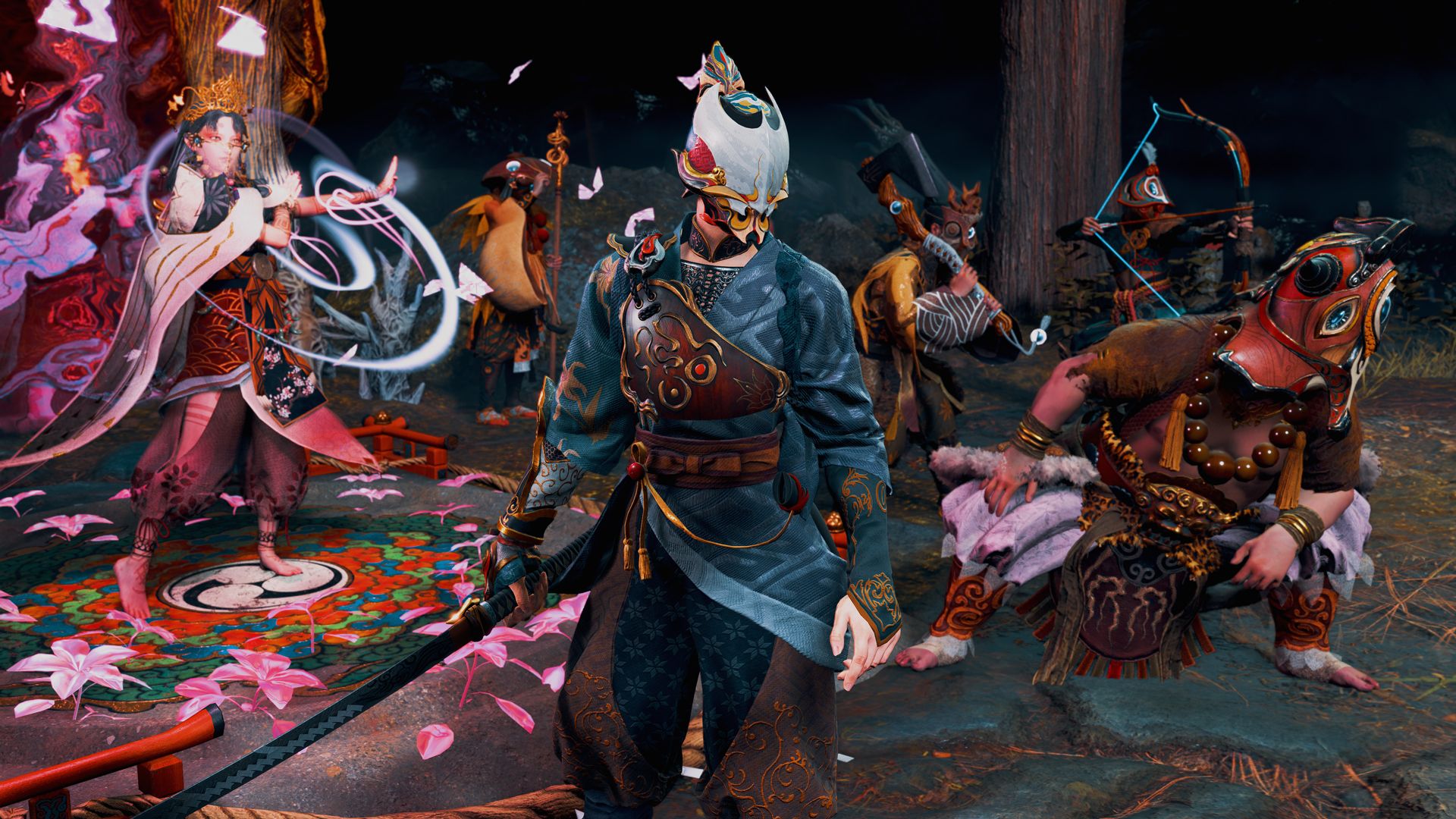
Kunitsu-Gami: Path of the Goddess has really strong mid-2000s energy. It captures that same sort of weirdness and out-of-the-box thinking that developers had after finding confidence in the second generation of 3D gaming. It’s especially novel to see Capcom, now hot off the success of its major franchises, taking a risk on a modest new game that’s all about its weird vibes and genre mash-up gameplay that feels cut from the same vibrant cloth of the 2006’s Okami.
Kunitsu-Gami: Path of the Goddess leans into a peculiar yet cozy vision of Japanese folklore while running on an engaging blend of tower-defense-style strategy action and smooth-as-hell hack-and-slash combat. As I undertook Kunitsu-Gami’s pilgrimage to purge malevolent demons across a corrupted mountain, I found a lot of comfort in leading a ragtag crew of villagers into some thrilling battles – even if some of those challenges were a bit too much to handle.
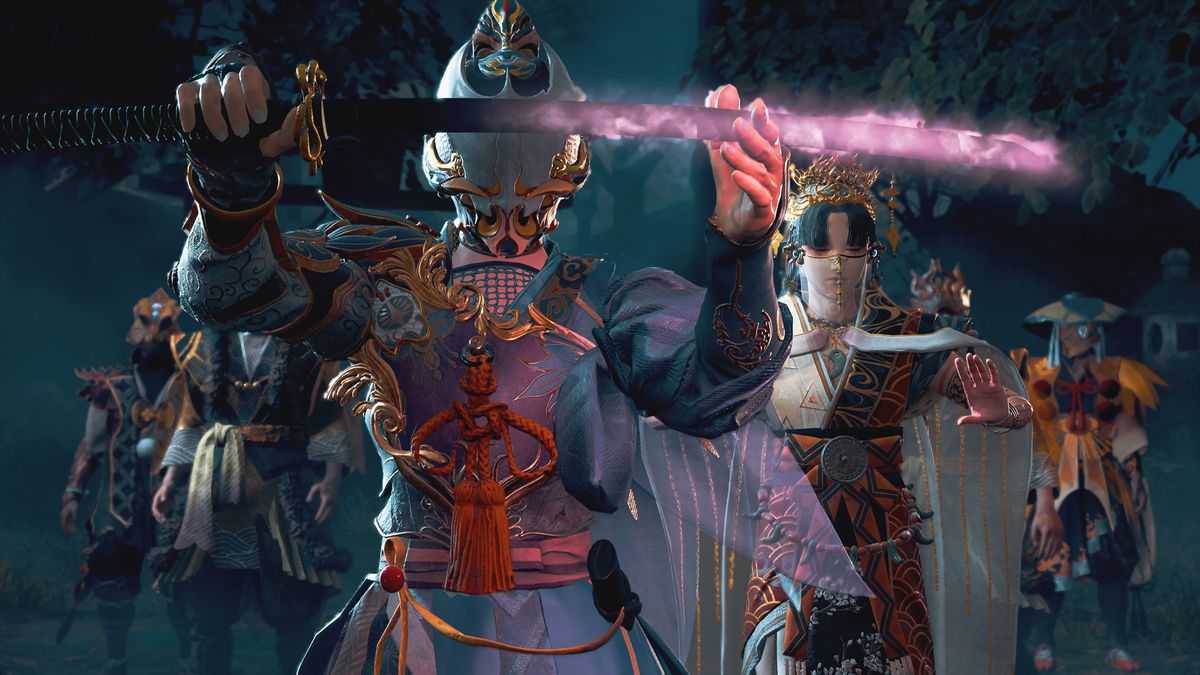
Taking on the role of a guardian spirit named Soh, you’re brought to the mortal realm to protect the shrine maiden Yoshiro after demonic forces have invaded the mountaintop temple and the surrounding communities below. To fight against the growing corruption, Soh and the titular goddess must collect masks of power and recruit rescued villagers to purge the defilement and restore the mountain to make it a safe haven again.
Kunitsu-Gami: Path of the Goddess keeps its storytelling light throughout its 20-hour campaign, focusing more on building an atmosphere and tone as you tear through demon dens with your party. Aside from the occasional transitional cutscenes between missions, Capcom leans on lore details from menus and the striking visual style with an almost psychedelic aesthetic applied to Kunitsu-Gami’s unique vision of a Japanese fable.
This subdued narrative works in Kunitsu-Gami: Path of the Goddess’s favor, and much like Capcom’s Okami, the core plot taps into that same aspect of restoring harmony between nature and the world’s inhabitants. It’s a compelling hook in action, and Kunitsu-Gami somehow manages to be both gorgeously grotesque and tranquil in its coziness as you retake areas from the demons after a hard-fought battle.
As something of a road story, Soh and the Maiden’s trek showcases the many ruined villages and settlements and seeing them rebuilt with rescued villagers. Once restored, you can spend time rebuilding them with the villagers to earn rewards. This manifests as a light-city builder mechanic, although Kunitsu-Gami: Path of the Goddess doesn’t dwell on it much. Still, it added a sense of community and newfound harmony, adding to the familiar, cozy feeling that the experience does such a fine job of cultivating throughout its runtime.
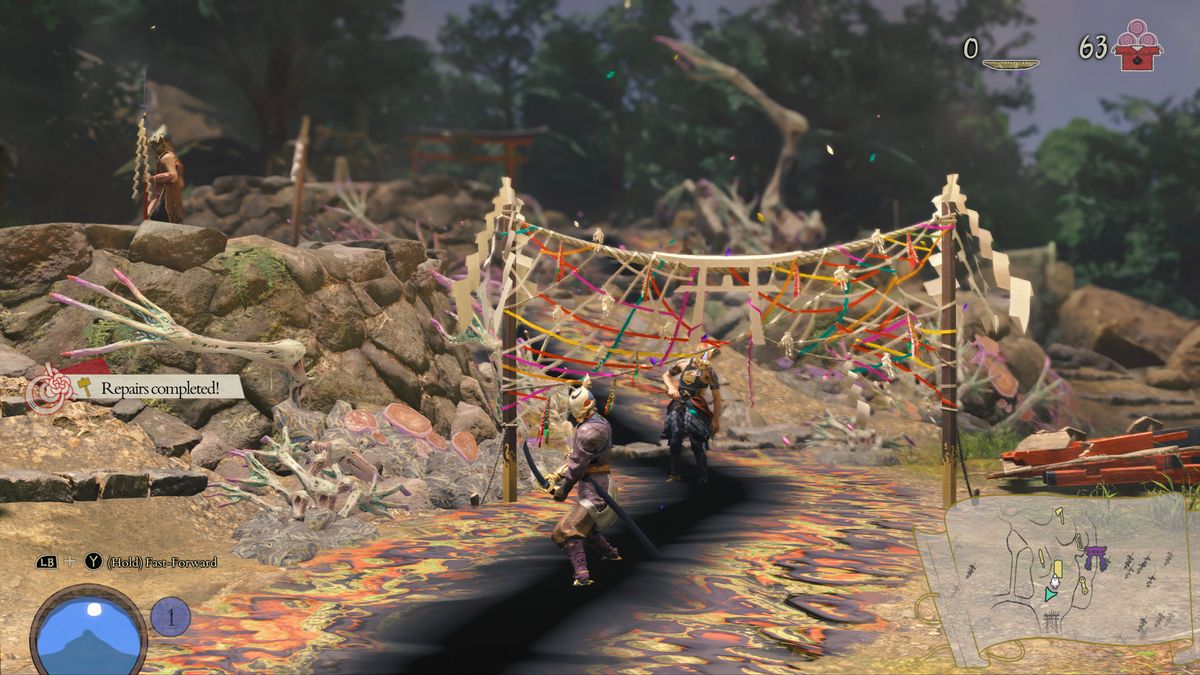
Playing as Soh, you’re both an active combatant and unit strategist on the battlefield. Within a day and night cycle, you’ll build your defenses and units by extracting resources from the field in the day and then fighting off demonic forces that flood the field by night. By carving a path into the ground with Soh’s sword, you create a passage for the maiden Yoshiro to walk to reach a level’s key areas to purge the corruption – all while avoiding attacks from enemies.
It’s a really engaging blend of a strategy game’s extract and expand-style flow with the action of a brawler. I liked exploring every nook and cranny of each stage to find captured villagers and assign them roles in my party, such as spearman, sumo wrestler, shaman, or marksman. While the tower defense element inspires some expectations of being passive by letting your units do the work, you are an active participant, and that especially means adapting to changes in battle jumping into the fray on your own.
There’s an element of resource management to offer balance, so while I had a familiar crew, I often had to be mindful of funds so I wouldn’t be without resources for more critical goals. There are so many different systems at work in Kunitsu-Gami: Path of the Goddess, and I was generally impressed by how well you can outfit Soh’s loadout of talismans and combat styles, along with the roster of units you can bring into a fight. When everything clicked, I found battles to be so satisfying to take on, and seeing my units effortlessly handle foes while I was on the other side of the field busting out combos and super attacks against a legion of enemies was a lot of fun.
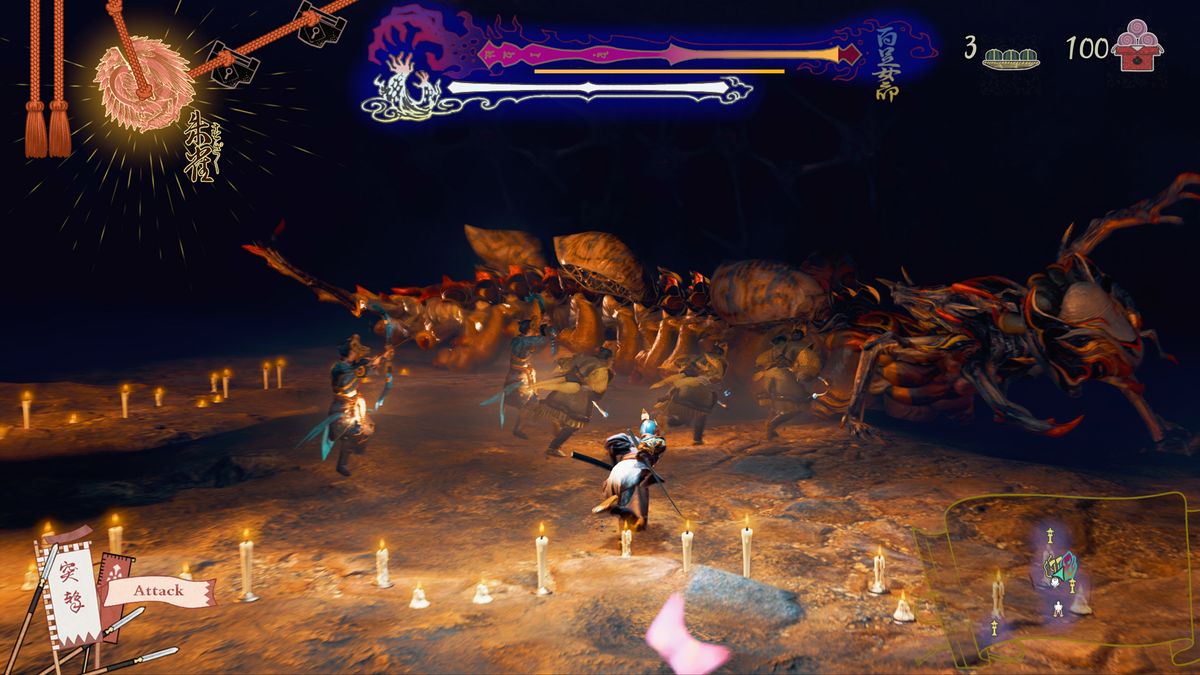
Unfortunately, one of my significant struggles with Kunitsu-Gami: Path of the Goddess is that I felt it had some difficulties with properly explaining its systems or, in more frustrating instances, locking out additions to the toolkit that would have been far more useful earlier on. There’s so much to the unit management and upgrading; some parts feel unexplained. At times, during the more intricate fights that required more nuance, I was struggling to figure out how best to manage my units and the flow of battle.
During the early hours, I often felt that Soh’s abilities could handle most encounters, which left my villagers serving in support roles. Whenever I felt things were getting too familiar, Kunitsu-Gami: Path of the Goddess throws in some wild curveballs to battles, such as fighting on moving boats, in poisonous swamps, or having Soh turned into a spirit form, making them entirely dependent on unit management in the field. Some of my favorite moments came from these encounters where I had to use every tool I had, all while running from one encounter to the next as Soh.
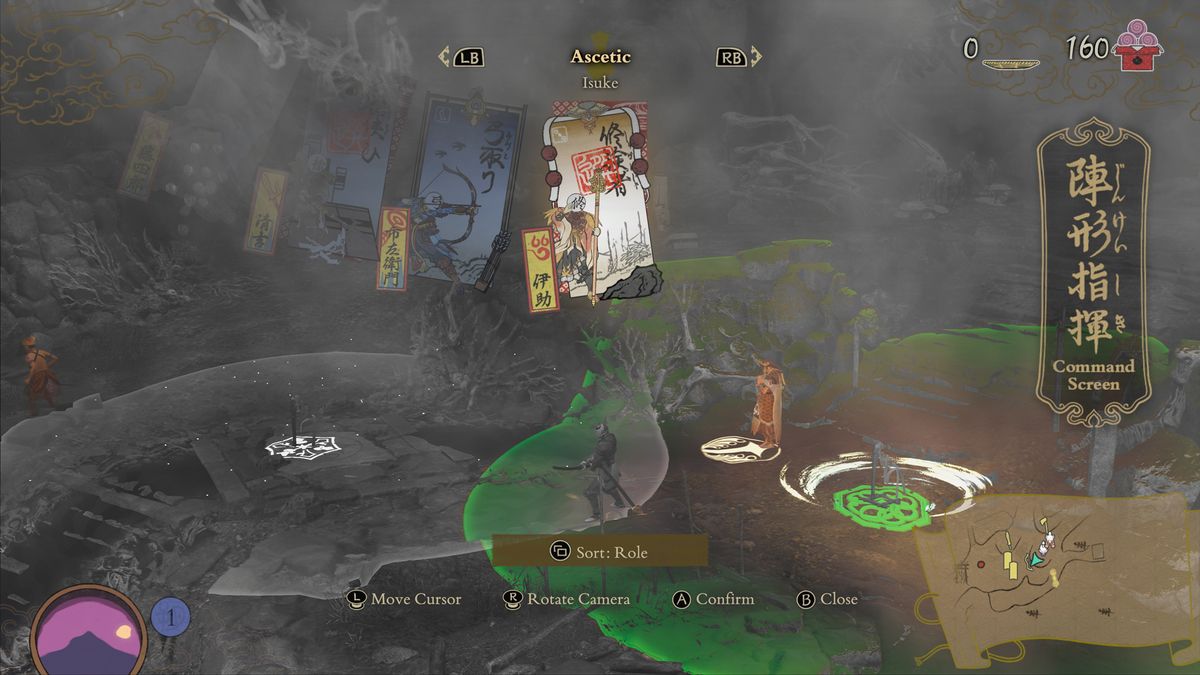
Kunitsu-Gami: Path of the Goddess balances its difficulty well, but a few encounters made such a sharp uptick in challenge that I had to restart the level to go in with a fresh start. Most of these frustrations come from the encounter design in certain missions, which sees enemies flood the field in higher frequency while adding elite monsters that can buff enemies. In addition to getting the shrine maiden to the checkpoint, you also have to ensure she’s safe and you have proper defenses.
In a few frustrating instances where battles went wrong, the shrine maiden would stop her movement at a particularly rough spot – an unexpected kill box positioned near two enemy spawn points. No matter how I lay out my defenses, enemies still clobber me. Since the maiden can’t move at night, you must commit to a battle as it lands. While you can control her movement and where she can stop, it’s easy to lose track of the maiden, while collecting resources and building your squad can be easy. Even with the generous checkpoints, all that did was restart me right before the bloodbath. Despite these steep difficulty spikes, Kunitsu-Gami: Path of the Goddess does present a fair engagement overall – and it was especially thrilling clearing through some challenging hurdles.
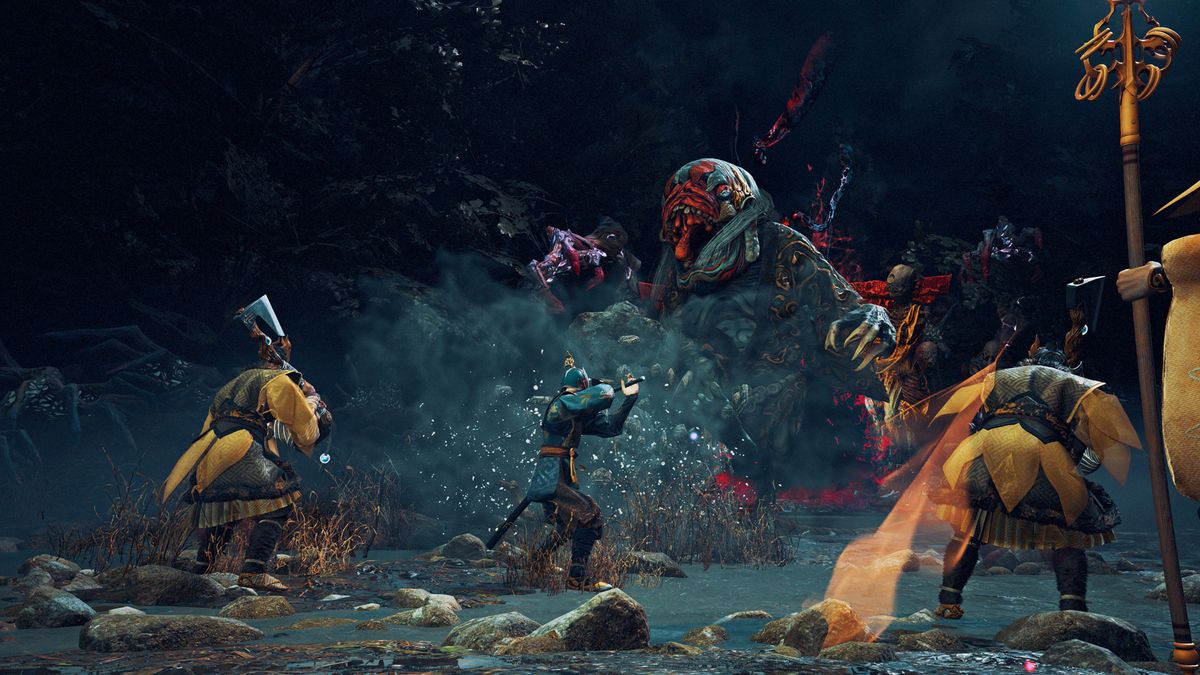
What I enjoyed most about my time with Kunitsu-Gami: Path of the Goddess is how unapologetically strange it can be with its monsters and combat, all while revealing a very endearing and cozy side with the setting and its characters. This game lets its calm, harmonious tone establish such a vibe, and when taken in as a whole, it makes going through Kunitsu-Gami’s world feel so serene – which adds a sense of satisfaction when seeing villages once demon nests now teeming with life.
While some of the game’s battles presented some frustrating roadblocks, I found a lot of fun and thrills in successfully combining the strategy and action components. In many ways, it’s a throwback to a now-classic era of Capcom. We don’t get many weird and equally stunning games like this one these days, and I’m glad that such an odd game walks its path with confidence and delight.